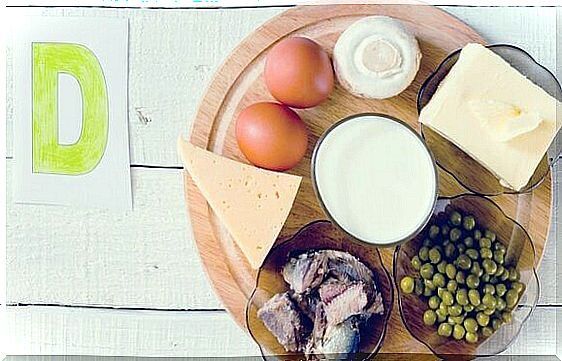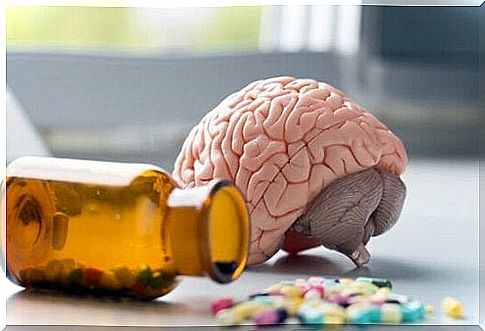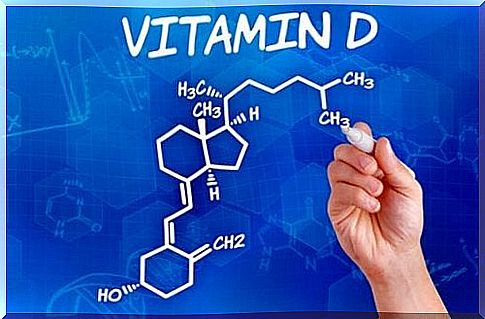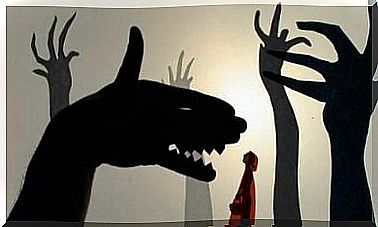Vitamin D And Brain: Relationship

The brain and vitamin D have a relationship that not everyone knows or that, at least, is not as popular as others. A deficiency in this vitamin has an impact on a cognitive level and on our personal aging. We are therefore faced with a neuroprotector that offers us numerous benefits, in addition to improving the quality of our bones or our ability to synthesize numerous minerals.
There are many people who suffer from hypovitaminosis D without knowing it. In fact, it is estimated that nearly 60% of people between the ages of 50 and 60 experience a deficiency of this steroid. As for the elderly population, the percentage rises to 80%. This is mainly due to two causes.
The first is that as we age, we stop synthesizing it so easily. The second is mainly due to our lifestyle habits. Vitamin D is synthesized through the skin and thanks to sunlight. We can also get it through food, especially dairy products.
Due to the many hours spent at work or the fact that as we get older we get out of the house less, we stop receiving it naturally with sunlight. With this, and in case we don’t like milk, dairy products in general or certain types of fish, the result will undoubtedly be an increasingly smaller accumulation of vitamin D until you notice its effects over time.
Let’s see all the data below.

The brain and vitamin D: the quality of our cognitive processes
Difficulty concentrating, memory loss, difficulty in reasoning, in reaching conclusions, in retaining new information … All this is part of the processes that can be conditioned by a vitamin D deficiency. These are neurological symptoms that we sometimes tend to overlook and which are not always related to this deficiency.
In general, whenever we talk about this vitamin we relate it to calcium, to the strength of our bones and to the onset of osteoporosis in the event that optimal levels of the same are not maintained. So, the relationship between the brain and vitamin D has been known for a few decades, since the large number of processes that regulate this essential element for our well-being was discovered.
- For example, vitamin D is known to activate and deactivate enzymes in the brain and cerebrospinal fluid that participate in neurotransmitter synthesis and nerve growth.
- Likewise, this vitamin protects neurons and reduces inflammation.
- A study by neuroscientist David Llewellyn at the University of Cambridge showed that, at lower levels of vitamin D, people performed worse in tests of mental agility and performance.
- The ability to process information becomes slower and more difficult.
As we see, sometimes something as simple as suffering from a vitamin deficiency has a direct impact on our brain health.
Symptoms of a vitamin D deficiency
If we have a vitamin D deficiency, the most likely thing is that you won’t notice the symptoms at first. Furthermore, the lack of this vitamin is sometimes attributed to other ailments and diseases, and even to simple aging. Therefore, one of our personal goals should be precisely to invest in good aging, in a good quality of life with which to take care of our cognitive processes, of our brain which, being a fabulous muscle, can reach advanced ages in a way that correct.

Now let’s see what possible symptomatology is associated with hypovitaminosis D:
- Tiredness.
- Muscle weakness.
- Pain in the hips and back.
- Problems with concentration.
- Loss of memory.
- Problems withholding new information.
How can we make up for our vitamin D deficiency?
The pharmaceutical and food industry, also aware of this relationship between the brain and vitamin D, launches on the market products rich in this dietary source. Notwithstanding that it is very common to acquire it from milk, yogurt or even cereals in which it is present.
Let’s see, however, other sources with which to always have good levels of vitamin D.
- Sunbathe every day for half an hour (avoiding the central hours of the day, when the sun’s rays are harmful).
- Salmon.
- Eels.
- Tuna.
- Sardines.
- Oysters.
- Chanterelle (a type of mushroom)
- Shiitake mushrooms.
- Cheese.
- Milk.
- Egg.
- Chickpeas.
- Almonds.
- Broccoli.
- Red algae (rich in agar).

To conclude, since the relationship between the brain and vitamin D is evident, let’s not think twice before consulting our doctor to see if we suffer from a deficiency. Before resorting to vitamin supplements and supplements on our own, it will always be advisable to rely on the advice of professionals in the sector or include some food that contains it in our diet.
Relying on good levels of this element will even allow us to have a stronger immune response and a more resilient mood to cope with daily difficulties and stress. Therefore, we do not underestimate the importance of good and proper nutrition .









